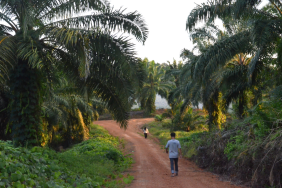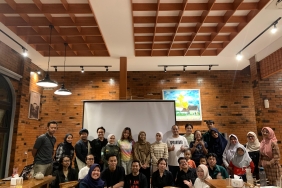INVESTIGATIVE REPORT REVEALS PALM OIL FROM MAJOR COMPANIES VIOLATES DEFORESTATION-FREE COMMITMENTS OF MAJOR GLOBAL BRANDS
Jakarta, Indonesia (July 19, 2018)- A new Eyes on the Forest (EoF) report shows that oil palm illegally planted inside national parks in Sumatra and surrounding areas - which are also home to elephants and tigers - could be making its way into the supply chains of palm oil producers and traders operating in Indonesia, breaking their deforestation-free agreements and those of their customers. In Tesso Nilo National Park, 75 percent of the park has been converted to illegal oil palm plantations, destroying the last remaining habitat for endangered species.
A series of undercover investigations conducted by EoF since 2011 identified 22 mills buying oil palm fruit - Fresh Fruit Bunches (FFB) - illegally planted within protected forest areas and forest estate in Central Sumatra; Tesso Nilo and Bukit Tigapuluh. Some of these companies are "repeat offenders" and the random and small-scale nature of these inspections only shows "the tip of the iceberg."
These investigations reveal how palm oil from the companies involved can enter the supply chain at different stages of four palm oil companies - Apical's Royal Golden Eagle (RGE), Wilmar, Musim Mas, and Golden Agri Resources. In the latest report, the RGE group appears to be directly involved, as the Asian Agri group of companies operates one company that was found to be buying FFB from the national park. In addition, Wilmar continues to buy from one of these companies; a company they sold in 2014 after a WWF report in 2013, found that the company was buying FFB from Tesso Nilo.
For a long time, Sumatra has been a major production center for major palm oil traders, including these "Big 4" who are responsible for more than 75 percent of the global palm oil trade. EoF's analysis of satellite images found that Sumatra lost 56 percent of its 25 billion hectares of forest in the last 30 years, with only 11 billion hectares remaining in 2016. The EoF report revealed that 21 of the 22 companies were able to sell illegal palm oil indirectly, and in some cases, directly, to major global traders and brands including: AAK, ADM, Bunge, Cargill, Colgate-Palmolive, Fuji Oil, General Mills, IOI, Kellogg's, Louis Dreyfus, Mars, Mondelēz, Neste, Nestlé, Olam, PepsiCo, Procter & Gamble, Reckitt Benckiser, Sime Darby Plantation, and Unilever.
EoF has been able to make the link to downstream companies as some of these brands have only recently responded to calls for more transparency in their supply chains by publishing details of their supplier companies. EoF and WWF commend some of these brands for their transparency and for taking the important first step to trace the origin of FFB, and call on all companies to do the same. Without traceability and publishing palm oil purchases to plantation sources, companies and the palm oil industry cannot fulfill deforestation-free agreements. Brands should call on producers and traders to follow their example in transparency and meet 100 percent traceability to plantations as soon as possible, while prioritizing high-risk landscapes, as monitored by EoF investigations.
"It is disappointing that despite their commitments to halt deforestation, major traders are found to be accepting oil palm grown at the expense of precious forests, even within national parks, thus contaminating global supply chains," said Elizabeth Clarke, WWF Global Palm Oil Leader. "Clearly, existing traceability efforts are not enough. Companies must stop sourcing and trading palm oil from unsustainable plantations and establish rigorous systems to achieve deforestation-free supply chains. Without such efforts, tainted palm oil will continue to flow through the supply chain and end up in shopping carts without consumers realizing it."
"Stopping the flow of palm oil from illegal and unsustainable sources is fraught with challenges, but that's no reason for companies not to act. Working collectively, the industry can address the clear problems that still exist and continue to pollute global supply chains with unsustainable palm oil that threatens the future of national parks and protected areas," added Elizabeth Clarke.
The report urges industry stakeholders - traders and buyers - to take action not only to ensure legal and sustainable palm oil supply chains, but also to support efforts to protect and restore the landscapes they have taken over. "WWF is committed to building an industry platform to find ways to eliminate the supply of FFB from illegal plantations in critical landscapes," said Aditya Bayunanda, Director of Policy, Sustainability and Transformation Programs at WWF-Indonesia. "We hope this EoF report can catalyze collaboration and stimulate real efforts towards solutions that can protect precious forests and the wildlife within them."
-FINISH-
For more information, please contact:
➢ Dewi Satriani, WWF-Indonesia Communications Manager | HP: 0811 910 970 | Email: dsatriani@wwf.id
Nursamsu, WWF-Indonesia | HP: 0811 7582 217 | Email: nursamsu@wwf.id
Editor's Note:
Investigative Report: Enough Already (2018) http://eyesontheforest.or.id/reports/laporan-investigatif-cukup-sudah-jun-2018




